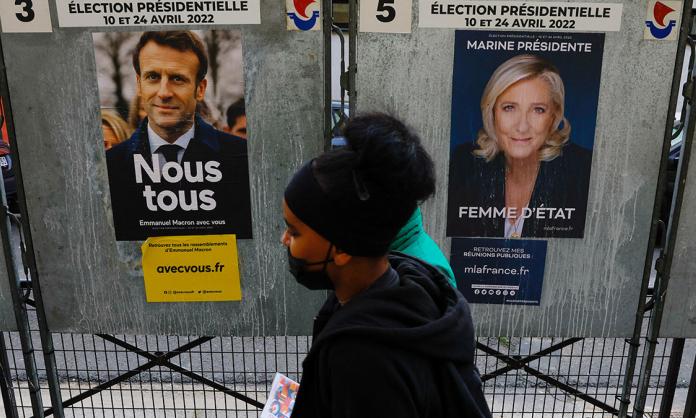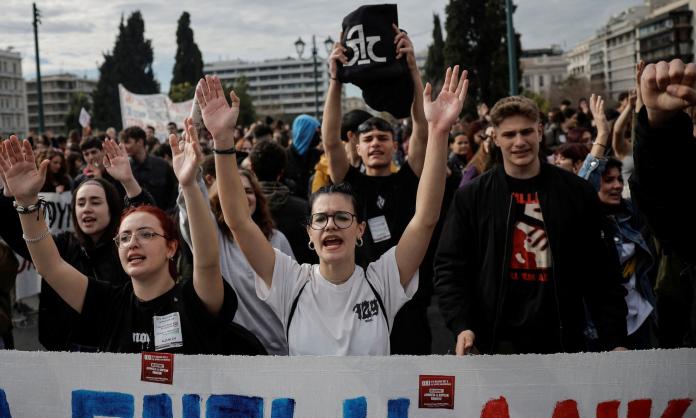The results of the French presidential election in late April expose an intensifying crisis and polarisation within French society. In the second-round run-off, President Emmanuel Macron was returned to office with slightly more than 58 percent of the vote against his far-right rival Marine Le Pen. Although Le Pen was beaten, her 42 percent support was the highest yet recorded by a far-right candidate, an alarming development.
Electoral polarisation also created space on the left. In the first round of voting, Jean-Luc Mélenchon’s party La France Insoumise (LFI—Unbowed France) campaigned on a left reformist program and fell just 420,000 votes short of beating Le Pen into second place and thus moving into the second round.
The traditional parties of French capitalism—the centre-right Republicans and the centre-left Socialists—were nearly annihilated. These two parties between them won every presidential election from the time the Fifth Republic was established in 1958 until 2017. Even as late as 2017, the Republican candidate received 20 percent of the first-round vote. At this election, they received 4.7 percent, and the Socialists trailed further behind with just 1.7 percent.
The collapse in the vote for the traditionally dominant parties has its roots in the global financial collapse of 2008. The Republican Party President Nicolas Sarkozy was defeated in the 2012 general election by the Socialists after pushing through a series of unpopular attacks. Sarkozy and a string of his colleagues were convicted of charges relating to corruption and embezzlement—lining their own pockets while forcing workers to pay for the crisis. Socialist President François Hollande raised hopes of an alternative but ended up abandoning any pretence of progressive reform to shore up support from big business. Both parties paid the price with poor results in 2017.
Macron was the main beneficiary of the implosion of the traditional parties, winning the presidency in 2017. While posing as a clean skin, Macron was a creature of the establishment—a former senior civil servant and investment banker, who served as minister of the economy in Hollande’s government. As minister, Macron was responsible for some of the government’s harshest anti-worker legislation. But Macron sensed the prevailing winds in 2016, jumping ship and building his own party—La Republique En Marche! (The Republic on the Move). He claimed that his party was a break from the orthodoxy of French politics, transcending the traditional left and right.
When he was elected in 2017, Macron was lauded by liberal pundits in Washington, London and Berlin for championing the cause of the political centre in a world that was looking increasingly polarised. But Macron’s election victory in 2017 never represented a widespread endorsement of his political platform. He received only 24 percent of the vote in the first round and prevailed against Le Pen only by calling on all parties from left to right to endorse his candidacy to stop his far-right opponent. It was on that “lesser evil” basis that Macron garnered 66 percent of the vote in the second round, not because voters were convinced that he could deal with the main issues of high unemployment and economic downturn. Macron’s 2022 campaign was more of the same; voters were asked to put aside their dislike of his record in office to prevent a Le Pen presidency.
That Le Pen could increase her vote by more than 2 million in the 2022 election demonstrates the futility of the idea, common in liberal circles, that unifying behind a capitalist politician can stop the advance of the far right. Far from driving Le Pen to the political margins, Macron’s first term in office only made the far right stronger.
Macron’s hardline neoliberal agenda is incapable of addressing the crisis of French society, which breeds support for Le Pen’s ideas. After five years of the Macron presidency, the 500 richest families in France have doubled their wealth, while the number of children living in poverty has risen by 40 percent. Macron wants to intensify this inequality—campaigning in the recent election on measures like raising the pension age from 62 to 65 and forcing welfare recipients into work. Macron’s pro-business record allows Le Pen cynically to pose as a defender of working-class living standards and carve out a base amongst the rural poor and some sections of the working class.
Macron has attempted to deflect anger at his neoliberal agenda by promoting racist and authoritarian policies which aid the far right. Racism and Islamophobia are deeply rooted in French society. An open letter published last year by a group of retired army generals warned that the government’s supposed “concessions to Islamism” threatened the “survival of our country” and threatened looming civil war. Macron has deliberately stoked this hatred—in 2020 he introduced an “anti-separatist bill” to parliament, claiming France’s 6 million Muslims threatened to create a “counter-society”. The legislation has empowered the state to close down 22 mosques in the last eighteen months. Organisations that provide legal aid and advocacy to Muslims who are victims of discrimination have been banned, as well as Palestine solidarity groups.
Rather than undercutting Le Pen’s support, this only legitimised her positions and normalises far right politics. This was demonstrated in the first round of this year’s elections, in which Le Pen and a candidate even further to her right, Eric Zemmour, together polled 30 percent of the vote in a field of twelve contestants, up from Le Pen’s 2017 first-round tally of 21 per cent. Fascists are cheering this as a victory and eagerly awaiting their next shot in 2027.
Le Pen’s party National Rally, formerly known as the National Front, has roots as a classic Nazi-nostalgic fascist outfit. It was founded by her father, Jean-Marie Le Pen, and began making serious headway in French politics in the 1980s by scapegoating migrants for high unemployment and rising crime rates. Nonetheless, the party’s explicitly Nazi elements, including the leader’s open celebration of the Holocaust, meant that it was never a serious contender for the presidency. Marine, who pushed her father aside in 2011, carried out a process of “detoxification” to make the party more electorally viable. But detoxification also means making the party acceptable to French capitalists. Le Pen has rolled back positions seen as threatening to their interests—for example moderating her previously strident opposition to the European Union. Inevitably, Le Pen’s attempt to bring National Rally into the mainstream has created a space to her right, which has been filled by Zemmour, a media personality and Islamophobe. Gathering 7 percent of the vote in the first round, Zemmour won scores of defectors from Le Pen’s party by pledging to wage a civilisational war against Islam. Zemmour is far from displacing National Rally, as the election results prove, but his rise is a warning of the continued threat of a slide to the right.
On the left, Mélenchon increased his vote from just under 20 percent in 2017 to 22 percent in this contest. Mélenchon was originally from the left of the Socialist Party. He broke with the party in 2008 and went on to form LFI as his own electoral vehicle in 2016. Mélenchon’s campaign pledged to shorten the working week, lower the pension age, raise the minimum wage and cap inheritance at €12 million. He argued for a transition to 100 percent renewables and the creation of 1.5 million green jobs. His campaign called out Le Pen as a fascist, and he joined a major march against Islamophobia, drawing the ire of racist politicians and the media.
Against a backdrop of widening inequality and social instability, Mélenchon clearly struck a chord amongst sectors of society that hate the status quo. He polled higher on average amongst blue collar workers and those under 30. Very significantly, he drew substantial support from Muslims, who, far from cowering under the weight of the attacks against them, rallied to Mélenchon’s side: 70 percent of Muslim voters backed him. Mélenchon was able to attract large crowds to his rallies—his meeting in the blue-collar city of Marseille on 8 April drew an estimated 70,000.
Mélenchon’s success is partly a reflection of the left-wing social struggles which have taken place in recent years. France is different from other Western European countries in that the workers’ movement has not been as roundly defeated in the neoliberal era as it has elsewhere. While there has been a partially successful chipping away at hard-won rights, attacks on the working class nearly always provoke a serious fight. Mobilisations and militant strikes are a frequent occurrence.
In late 2018, the gilets jaunes, or “yellow vests” movement, exploded in response to Macron’s attempt to increase fuel taxes. This movement, based in the provinces, took the form of constant, insurgent demonstrations, blockades and riots, with actions involving anywhere from a few dozen to half a million. Every weekend, thousands of protesters descended on Paris to demonstrate and fight police. While most who were mobilised had no connection with the existing French left and its organisations, they articulated a program of clear class demands, including a raise to the minimum wage and a solidarity tax on wealth.
Then, in late 2019, a militant strike wave emerged that took the combative spirit of the gilets jaunes and combined it with the social power of the organised working class in large industry. Red Flag in early 2020 reported on these strikes, which were kicked off by railway workers in response to government plans to undermine pensions:
“For six weeks, the working class of France has been waging war against its government. Strikes have swept railway lines, refineries, schools, and power plants. Pickets have sprung up at transport depots. Enormous demonstrations have taken over the major cities and towns across the country. Paris’ demonstration on 9 January was kilometres long, with contingents from different industries and union federations, student contingents, lawyers, feminist blocs, a kaleidoscope of different campaign groups—each with their own chants, placards, slogans, and in some cases dance routines. But the movement’s heroes are these rail workers, who have maintained their strike consistently since 5 December last year, developing democratic rank-and-file organisations to decide their tactics and strategy.” This wave of struggle forced Macron to abandon his plans to cut pensions.
There are clear limits to Mélenchon’s reformist platform. Mélenchon looks to the institutions of the French state to transform society in favour of workers. His campaign does not break from the strong nationalist tendencies of French politics, which undermines his ability to fight racism and also identifies the interests of French workers with bosses and the state. LFI is not a democratic mass workers’ party—it is a tightly centralised electoral vehicle built around his profile. Candidates and policy are determined by a tight inner circle, and there are limited ways for people to get involved beyond electioneering. But his strong showing at the election demonstrates the audience that exists for a campaign to beat back the right.
Looking forward, there is little reason to believe that Macron will enjoy a honeymoon period after his re-election. Taking into account the many millions who abstained in the second round of voting or who cast a spoiled or blank vote when given the choice between a banker and a fascist, Macron won the support of just 39 percent of the electorate. His second term in office looks set to continue the pro-capitalist agenda of his first. Political polarisation is likely to deepen—resentment at economic attacks has not abated since the mass movements of 2018 and 2019 shook French society, and the country’s old political structures have fallen apart.
The situation is full of potential but also dangers. While millions of workers and minorities doubtless breathed a sigh of relief that the far right had been kept from office this time, if the left does not use this opportunity to build its forces, there is a real prospect a far-right candidate could win the presidency in 2027.










